Final crosstable

The San Antonio Church's Fried Chicken Inc. First International Chess Tournament [1] was a chess competition held in San Antonio, Texas, from November 19 to December 11, 1972. Sponsored by fast food franchise Church's Chicken as a marketing strategy to promote the company and an attempt to capitalize on the rise of the game's popularity in the U.S, the tournament was regarded at the time the strongest chess tournament held in the country since 1924. [2] The list of players invited included famous names like former world champion Tigran Petrosian, regular contenders to the world crown Svetozar Gligoric, Paul Keres and Bent Larsen, and some promising stars, among them Brazilian Henrique da Costa Mecking and future world champion Anatoly Karpov. [3]
As a Category XII event (average rating of 2539), the San Antonio Church's Fried Chicken Inc. First International Chess Tournament [4] was strong enough to be regarded at the time the most important chess competition to be held on American soil since New York 1924. Newly-crowned world champion Bobby Fischer and former champion Boris Spassky were also invited, but declined.
The competition was held at the Hilton Palacio del Rio, where the players also stayed. An open tournament was held alongside the main event, attracting 113 players. Harry Golombek was the tournament director.
The three-way tie for first place among Petrosian, Portisch and Karpov (all with 10½ /15), confirmed the pre-tournament prediction for Petrosian, Portisch's status as a top 10 player, and the arrival of Karpov at the elite level.


Jørgen Bent Larsen was a Danish chess grandmaster and author. Known for his imaginative and unorthodox style of play, he was the second strongest non-Soviet player, behind Bobby Fischer, for much of the 1960s and 1970s. He is considered to be the strongest player born in Denmark and the strongest from Scandinavia until the emergence of Magnus Carlsen.

Wolfgang Unzicker was one of the strongest German chess Grandmasters from 1945 to about 1970. He decided against making chess his profession, choosing law instead. Unzicker was at times the world's strongest amateur chess player, and World Champion Anatoly Karpov called him the "world champion of amateurs".
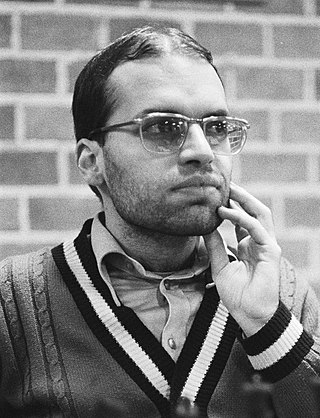
Henrique Costa Mecking, also known as Mequinho, is a Brazilian chess grandmaster who reached his zenith in the 1970s and is still one of the strongest players in Brazil. He was a chess prodigy, drawing comparisons to Bobby Fischer, although he did not achieve the International Grandmaster title until 1972. He won the Interzonals of Petropolis 1973 and Manila 1976. His highest FIDE rating is 2635, achieved in 1977, when he was ranked number four in the world. He became the 3rd best in the world in 1977, behind only World Champion Anatoly Karpov and Viktor Korchnoi. He is the first Brazilian to become a grandmaster. Despite winning his first national championship at the age of 13, he played in very few tournaments. He won at Vršac in 1971 and finished third with Robert Byrne at Hastings in 1971–72. In 1975, he twice shared second place behind Ljubomir Ljubojević, firstly at Las Palmas with Ulf Andersson and Mikhail Tal and then at Manila with Lev Polugaevsky, Bent Larsen and Helmut Pfleger.
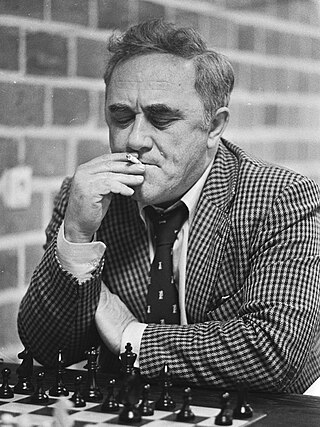
Efim Petrovich Geller was a Soviet chess player and world-class grandmaster at his peak. He won the Soviet Championship twice and was a Candidate for the World Championship on six occasions. He won four Ukrainian SSR Championship titles and shared first in the 1991 World Seniors' Championship, winning the title outright in 1992.

Lajos Portisch is a Hungarian chess Grandmaster, whose positional style earned him the nickname, the "Hungarian Botvinnik". One of the strongest non-Soviet players from the early 1960s into the late 1980s, he participated in twelve consecutive Interzonals from 1962 through 1993, qualifying for the World Chess Championship Candidates Cycle a total of eight times. Portisch set several all-time records in Chess Olympiads. In Hungarian Chess Championships, he either shared the title or won it outright a total of eight times. He won many strong international tournaments during his career. In 2004, Portisch was awarded the title of 'Nemzet Sportolója', Hungary's highest national sports achievement award.
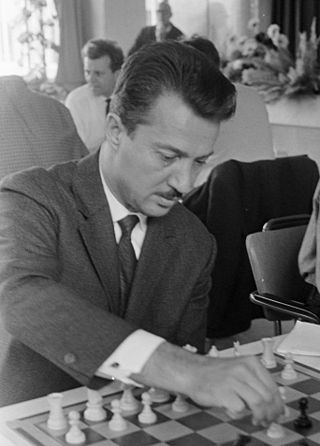
Svetozar Gligorić was a Serbian and Yugoslav chess grandmaster and musician. He won the championship of Yugoslavia a record twelve times, and is considered the best player ever from Serbia. In 1958, he was declared the best athlete of Yugoslavia.
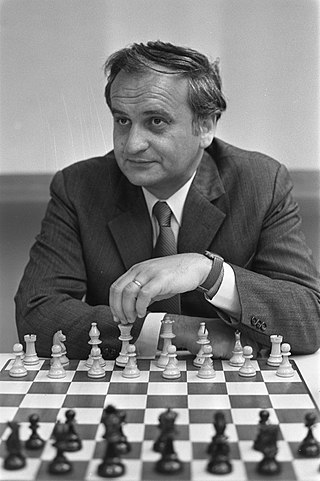
Borislav Ivkov was a Serbian chess Grandmaster. He was a World championship candidate in 1965, and played in four more Interzonal tournaments, in 1967, 1970, 1973, and 1979.
Burt Hochberg was an expert on chess and other games and puzzles. He authored and edited many books on chess, and served as editor of both Chess Life, and GAMES magazine. Hochberg has been the longest-serving editor in the history of Chess Life magazine.
Miguel Cuéllar Gacharná was a Colombian chess master from Tinjacá.
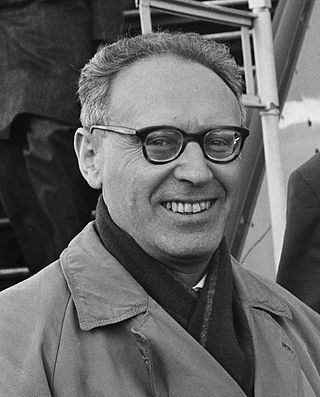
At the World Chess Championship 1963, Tigran Petrosian narrowly qualified to challenge Mikhail Botvinnik for the World Chess Championship, and then won the match to become the ninth World Chess Champion. The cycle is particularly remembered for the controversy surrounding the Candidates' Tournament at Curaçao in 1962, which resulted in FIDE changing the format of the Candidates Tournament to a series of knockout matches.
The Piatigorsky Cup was a triennial series of double round-robin grandmaster chess tournaments held in the United States in the 1960s. Sponsored by the Piatigorsky Foundation, only two events were held, in 1963 and 1966. The Piatigorsky Cups were the strongest U.S. chess tournaments since New York 1927.
Events in chess in 1969;
Events in chess in 1970;
Events in chess in 1971;
Events in chess in 1972;
Events in chess in 1973:
Events in chess in 1974;
Events in chess in 1975;
Events in chess in 1976;
General references